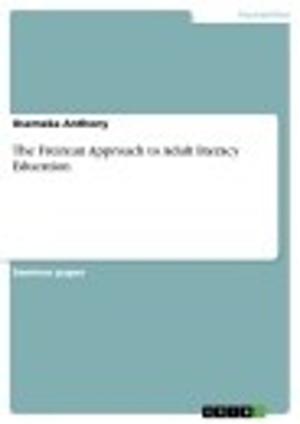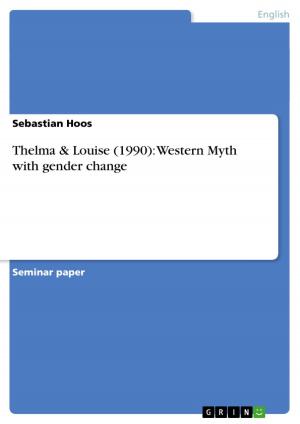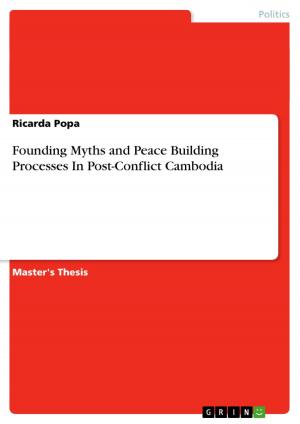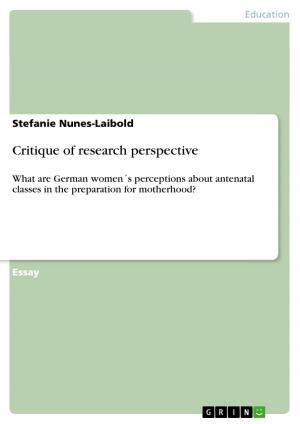Assessing ASEAN's Performance and Potential - 'Why has it been imperative for ASEAN to embark on a process of reform and 'reinvention' since the regional crisis?'
'Why has it been imperative for ASEAN to embark on a process of reform and 'reinvention' since the regional crisis?'
Nonfiction, Social & Cultural Studies, Political Science, International, International Relations| Author: | Sandra Tauer | ISBN: | 9783638559973 |
| Publisher: | GRIN Publishing | Publication: | October 23, 2006 |
| Imprint: | GRIN Publishing | Language: | English |
| Author: | Sandra Tauer |
| ISBN: | 9783638559973 |
| Publisher: | GRIN Publishing |
| Publication: | October 23, 2006 |
| Imprint: | GRIN Publishing |
| Language: | English |
Essay from the year 2006 in the subject Politics - International Politics - Region: South Asia, grade: 68% (credit), The University of Sydney, course: Dilemmas of Development in Southeast Asia, 28 entries in the bibliography, language: English, abstract: Singapore's Prime Minister Goh Chok Tong opened the 6thSummit of the Association of Southeast Asian Nations (ASEAN) in Hanoi with the words: 'This has been a traumatic year for ASEAN members.' Indeed, the financial crisis of 1997 marked the end of an extraordinary decade of internationally oriented economic growth throughout Southeast Asia, and came as a shock for the Southeast Asian countries. Although Paul Krugman had warned that Asian growth, like that of the Soviet Union in its high-growth era, seemed to be driven by extraordinary growth in inputs like labour and capital rather than by gains in efficiency, his was a lone voice in academic discussion. The severity of the crisis inevitably raised the question of how it would affect ASEAN. Ross Garnaut commented that the largest long-term effect of the crisis would be its effect on policy formulation. Since its formation in 1967, ASEAN has occupied a central role in the international relations of Southeast Asia.5It was the first regional organization in Asia, and is a crucial factor in East Asian and Asia-Pacific regionalism. From the beginning, ASEAN's mission was regional resilience against great power interests. Economic development in the region was perceived as means to ward off communist and ethnic rebellions. However, after three decades of promoting peaceful intra-regional relations, ASEANone of the most successful regional organizations in the developing world-has needed to seriously reinvent itself since 1997. As the Deputy Prime Minister of Singapore, Shanmugam Jayakumar, noted in April 2006: 'we have to rethink and remake ASEAN'. According to Jayakumar, ASEAN has to deepen and accelerate the process of integration to stay competitive in the face of the challenges confronting the regional grouping, or face the risk of being marginalised. Furthermore, he claimed that ASEAN must adopt a different paradigm with both bold and practical ideas for the future. This essay will examine four reasons why ASEAN must redefine its future aims, strategies and paths. The first part deals with its failure to react to the financial crisis, while the second outlines its norms, especially non-interference. Parts three and four analyse external factors: the rise of China, the emergence of East Asian regionalism and other geopolitical factors.
Essay from the year 2006 in the subject Politics - International Politics - Region: South Asia, grade: 68% (credit), The University of Sydney, course: Dilemmas of Development in Southeast Asia, 28 entries in the bibliography, language: English, abstract: Singapore's Prime Minister Goh Chok Tong opened the 6thSummit of the Association of Southeast Asian Nations (ASEAN) in Hanoi with the words: 'This has been a traumatic year for ASEAN members.' Indeed, the financial crisis of 1997 marked the end of an extraordinary decade of internationally oriented economic growth throughout Southeast Asia, and came as a shock for the Southeast Asian countries. Although Paul Krugman had warned that Asian growth, like that of the Soviet Union in its high-growth era, seemed to be driven by extraordinary growth in inputs like labour and capital rather than by gains in efficiency, his was a lone voice in academic discussion. The severity of the crisis inevitably raised the question of how it would affect ASEAN. Ross Garnaut commented that the largest long-term effect of the crisis would be its effect on policy formulation. Since its formation in 1967, ASEAN has occupied a central role in the international relations of Southeast Asia.5It was the first regional organization in Asia, and is a crucial factor in East Asian and Asia-Pacific regionalism. From the beginning, ASEAN's mission was regional resilience against great power interests. Economic development in the region was perceived as means to ward off communist and ethnic rebellions. However, after three decades of promoting peaceful intra-regional relations, ASEANone of the most successful regional organizations in the developing world-has needed to seriously reinvent itself since 1997. As the Deputy Prime Minister of Singapore, Shanmugam Jayakumar, noted in April 2006: 'we have to rethink and remake ASEAN'. According to Jayakumar, ASEAN has to deepen and accelerate the process of integration to stay competitive in the face of the challenges confronting the regional grouping, or face the risk of being marginalised. Furthermore, he claimed that ASEAN must adopt a different paradigm with both bold and practical ideas for the future. This essay will examine four reasons why ASEAN must redefine its future aims, strategies and paths. The first part deals with its failure to react to the financial crisis, while the second outlines its norms, especially non-interference. Parts three and four analyse external factors: the rise of China, the emergence of East Asian regionalism and other geopolitical factors.















